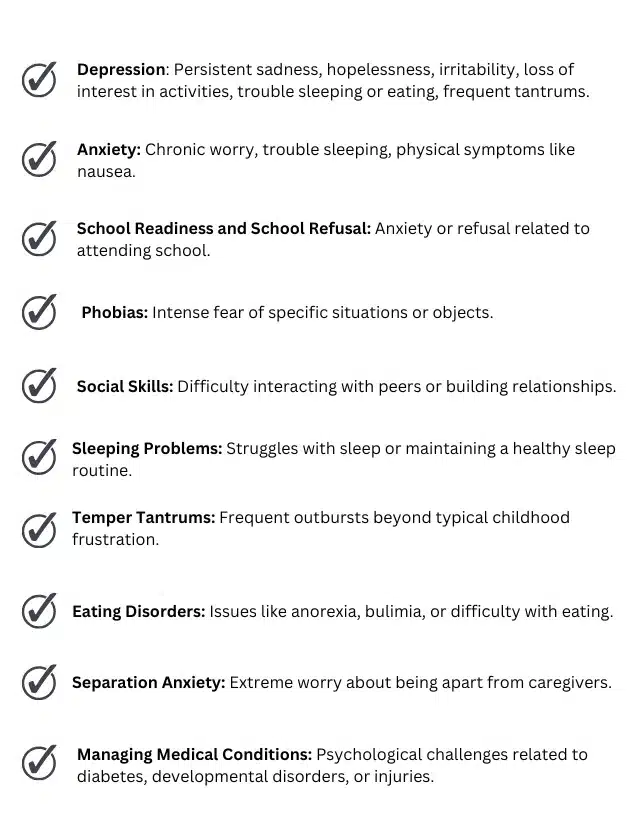Child Psychologists in Melbourne
SERVICES
Child Psychologists in Melbourne
Looking for a Child Psychologist in Melbourne?
When deciding on a Child Psychologist in Melbourne, it’s important to choose someone who understands child development and approaches their work with care, sensitivity, and kindness. At The Three Seas Psychology, our team is dedicated to getting on your child’s level, using gentle, compassionate techniques to make them feel comfortable and understood. We know that children process emotions differently, and our specialised care is designed to address a range of concerns, from behavioural issues to academic struggles, in a safe and supportive environment tailored to your child’s unique needs.
This personalised, compassionate approach highlights the value of working with an experienced child psychologist. At The Three Seas, we understand how differently children think and communicate, ensuring our psychologists are highly trained and experienced in child development. With dedicated child psychologists available across all four of our Melbourne locations, we focus on providing expert care that is not only effective but also tailored to your child’s unique needs, supporting them quickly and cost-effectively.
We can support children with

FAQs for seeing a Child Psychologist
When Should My Child See a Child Psychologist?
- If your child is experiencing frequent anxiety, emotional outbursts, or difficulties adjusting at school or home, a child psychologist can offer support. Our psychologists use child-friendly techniques to help them express their feelings and work through their struggles in a safe environmen
What Are the Benefits of Seeing a Child Psychologist?
- Children benefit from professional support in many ways. Our psychologists not only help your child develop emotional resilience but also offer parents tailored strategies for managing difficult behaviors and improving communication. We take a child-specific approach, explaining complex issues in a way they can understand, helping them feel safe and supported throughout the process.
How Do I Choose a Child Psychologist?
- Choosing the right psychologist is crucial. At The Three Seas, our psychologists are specialists in child development with extensive experience. We work closely with parents to understand the unique needs of each child and develop a customised treatment plan that fits their situation.
Will I attend sessions with my child?
- In most cases, parents or caregivers may attend initial sessions, particularly for younger children, to provide context and background. The child psychologist may then decide whether future sessions will involve the caregiver or focus solely on the child, depending on the child’s needs.
Does the caregiver see the child psychologist firs
- Yes, it’s common for the psychologist to meet with the caregiver first to gather information and better understand the child’s situation before beginning direct sessions with the child.
How many sessions will my child need to attend?
- The number of sessions varies depending on the child’s needs and progress. Some children may benefit from short-term therapy, while others may require ongoing sessions over several months.
I’m Looking for a Child Psychologist Near Me, Can You Help?
- With four convenient locations across Melbourne and flexible Telehealth options, we make it easy for families to access high-quality child psychology services close to home. Whether you’re looking for in-person sessions or prefer online support, we’re here to help.
Do you see children with ADHD?
- Yes, we provide support for children with Attention Deficit Hyperactivity Disorder (ADHD). ADHD is one of the most commonly diagnosed mental health conditions among Australian youth and can affect a child’s ability to focus, listen, and sit still. These challenges can impact their social skills, emotional well-being, and academic performance. Early intervention is key to managing symptoms and preventing further difficulties, such as depression or anxiety. We also support children with Attention Deficit Disorder (ADD), which involves attention difficulties without hyperactivity.
Contact Us for Appointment
General Enquiry
MELBOURNE CITY
RICHMOND
WANTIRNA SOUTH
FITZROY NORTH
Feeling overwhelmed in the early months of motherhood?
You’re not alone—and you don’t have to figure it all out on your own.
Join The New Mum Reset—a 4-week support group designed to help you reclaim calm, confidence, and connection.
✅ Release mum guilt & perfectionism
✅ Navigate identity shifts & relationships
✅ Build emotional resilience and sustainable self-care
Starts Saturday 6 July | Richmond Clinic | Limited spaces available

